VIEW FROM THE TOP: Kansas City violinist’s career takes a giant leap with three competition victories in a row
It was not preordained that Maria Ioudenitch would become a professional musician. It’s true that her parents, Kansas City-based pianists Tatiana and Stanislav Ioudenitch, saw an innate musicality in her from an early age, and that she showed fascination with the tiny violin they gave her when she was all of three years old. But young artists can grow in a variety of ways, not all of which lead to concert careers.
Still, “in addition to the excellent virtuosity, she was doing some very interesting things, sometimes without even knowing it,” said Stanislav, who is founding director of Park University’s International Center for Music and a professor of piano at the Oberlin Conservatory. “Already we could see that she could become a violinist: that she could even become a professional violinist.”
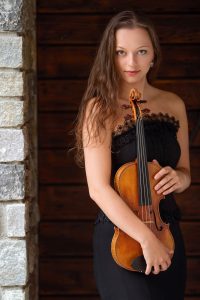
Maria did indeed advance quickly in her studies, first locally with Gregory Sandomirsky of the Kansas City Symphony and with Park University’s Ben Sayevich, then at the Curtis Institute of Music with Shmuel Ashkenasi and Pamela Frank.
But it was not until recently, when she discovered a sort of magical musical relationship with Miriam Fried at the New England Conservatory (with whom she is still working toward an Artist’s Diploma), that she noticed all the strands coming together.
Then something astonishing happened: This year Maria won first prize at three international competitions in a row, two of which are considered to be among Europe’s most prestigious “tests” of young violinists. Now the whole music world is suddenly talking about this Russian-born Kansas Citian, who just turned 26 this month.
After her July triumph in the Ysaÿe International Violin Competition in Belgium (which was held online because of COVID-19), in September Maria won the Tibor Varga Competition in Switzerland. Then in October she triumphed at the big kahuna, the 2021 Joseph Joachim International Violin Competition in Hannover, Germany, performing the Brahms Violin Concerto on the very instrument with which Brahms’ friend, Joseph Joachim, is said to have introduced the piece in 1879 (the 1714 “ex-Joachim Ma” Stradivarius, which the New England Conservatory owns and lends out to exceptional students). (The Brahms performance, featuring the NDR Radiophilharmonie Orchestra led by Andrew Manze, can be viewed on YouTube here.)
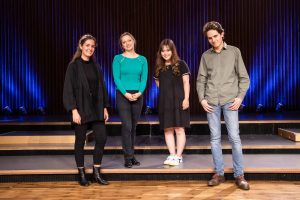
Kansas Citians will have a chance to hear our newest international star perform this spring, on the International Center for Music’s annual Stanislav & Friends fundraiser, scheduled for March 19th at the Kauffman Center for the Performing Arts.
At some point a musician has to know when to stop doing competitions and begin a career, though determining that is rarely an exact science. It does appear that Maria might be at that point. Along with the Joachim Competition win came a separate prize which will enable her to make her first professional recording, on Warner Classics, and of course she has been approached by several major international artists’ representatives toward building a concert career. (She is currently in conversation with one but cannot yet name it.)
“The only thing in your head is just to play from the heart,” Maria said recently of being in “competition mode” during such occasions. A contest performance should ideally be “absolutely the same as any other performance,” she said, “because you’re sharing music with other people.”
Naturally, sometimes during such high-pressure situations “thoughts creep in: Oh gosh I made a mistake, they’re going to kick me out. … But then you realize: I’m still playing music, I’m still playing for people, so stop thinking about yourself, Maria.”
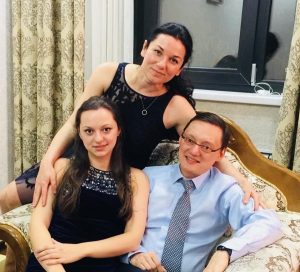
Maria is blessed to have been raised by parents who know a thing or two about competitions. In addition to his Gold Medal at the 2001 Van Cliburn International Piano Competition, Stanislav has served on juries of major contests around the world, and knows all too well the ins and outs of this gauntlet.
“Competitions give new goals and set the platform for young performers to grow as musicians,” Stanislav said. “Young talents get the opportunity to play in large halls and with the symphony orchestras, which is so important for their experience.” Moreover, contests give performers a chance to learn where they stand in the world. “Listening to their peers, they understand better their own level,” he added.
Tatiana, herself a concert pianist who met Stanislav while they were students in their native Tashkent, Uzbekistan, is founding director of the Overland Park-based Young Artists Music Academy, which every two years holds the Ovation Competition for piano students up to age 17.
“If you want people to hear your voice, you have to compete and show what you can do,” Tatiana said, “because this is the way to have exposure, to be seen and heard.” In addition, contests can be inspiring for young people, many of whom get a charge out of competing with their peers. “I say, do you like to run a race and come in first? And I see whose eyes light up. … And I encourage them to prepare for the competitions. It’s a great motivation.”
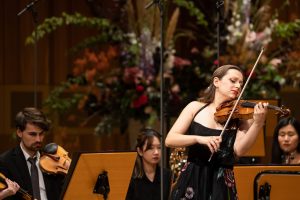
Maria’s preparation came from the best, beginning with her instruction in Kansas City. “Immediately when she started to play, there was something there,” said Ben, who taught Maria from age eight to the time she left for Curtis. “You can tell if a child relates to the sound … has a special, unique voice from an early age.” Even at age eight “there was definitely something of beauty in her way of relating to the violin, a uniqueness in her tone production,” Ben said.
Children often address music guilelessly, without the filters of fear or philosophizing. “Sometimes children play more musically than grownups, because they don’t intellectualize,” said Ben, whose violin studio at Park has produced an array of major concert artists. “They play naturally, using their gifts.” With Maria, the “digitality” so necessary for beautiful sound was accompanied by “an ability to play very naturally. … You could see that she had big possibilities right away.”
Still, Maria was not an easy student to teach: She was passionate, even headstrong, about her musical ideas. “But I truly believe now that … you have to be that way,” Ben said. “Because to make something great, you can only play through your own ‘channels,’ you cannot play at somebody else’s behest.” Teachers sometimes lose track of their role, he said, which is “to teach a person to find him or herself.”
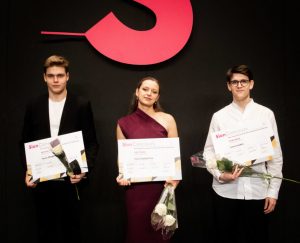
Nevertheless, finding a path artistically is one thing, and using that artistry to compete is another. Even after a few wins, there is still luck involved in building a career on them. “You have to have the right stars align,” Stanislav said. “There is a way, but a career is almost a lottery, and competitions are like a lottery. … Everything has to connect, because it’s really, really hard to get to the top.”
Maria appears to be well on the way, thanks partly to her time at Curtis with Pamela (who taught her “deep, deep analysis of the score,” Maria said, “of being true to what the composer wrote”) and Shmuel (who emphasized “emotion … and how to make the violin sound like it’s singing”).
She hopes to continue her studies with Miriam for as long as possible. “She was the one who really developed my sound as it is now,” Maria said. “And we’re still working on it! I have a long way to go.” She had been planning to enter more competitions. “But all my advisors tell me: ‘Just chill out. You have concerts. Let’s just see where this wave takes you.’ ”
—By Paul Horsley
—Cover photo by Helge Krückeberg
For information about upcoming ICM performances, go to icm.park.edu.
To reach Paul Horsley, performing arts editor; send an email to paul@kcindependent.com or find him on Facebook (paul.horsley.501) or Twitter (@phorsleycritic).





